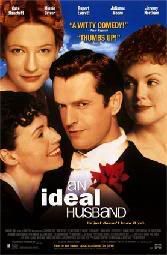|
Thursday, October 26, 2006
Oscar Wilde
Book: The Importance of Being Earnest and An Ideal Husband
Author: Oscar Wilde

[Clearly, I’m a little bored at nights and am compensating by catching up on weeks of belated book reviews. Sorry for the inundation, I think this is the last. And I’m working on making these shorter, I swear!]
Oscar Wilde is like raspberries, or olives, or shrimp. Sometimes you just get a craving for him. And when you do, nothing else satisfies.
The Importance of Being Earnest and An Ideal Husband were both re-reads for me, but well worth the time. Seven years had passed since I last read Wilde, and a re-visitation was more than overdue. Isn’t that one of the coolest things about books? As you change, so do they.
Actually, Earnest was just as I remembered it – delightfully trivial nonsense. Thankfully, there’s not a drop of serious thinking in this play. The basic plot is that there are two girls who have resolved to marry men named Earnest, and two men not named Earnest who have allowed the impression that they are Earnest to develop in the minds of said fair strumpets. Following? And as a result, “hijinks ensue.” (Thanks, ket!)
This is Wilde at his most pure – nothing but wit and snarkiness and playing with language. It’s a nice vacation for those who like words.
An Ideal Husband was both more interesting and more annoying for me the second time around. The plot involves Sir Robert Chiltern (a brilliant up-and-coming politician), his virtuous wife Lady Chiltern, and Mrs. Cheveley, a woman of questionable virtue who wants to blackmail Sir Robert with a scrap of dirty laundry from his past. Luckily, Lord Goring, Wilde’s ever-present dandy fop, is around to save the day with a sound philosophy hidden behind wit and folly. And he even manages to find his own true love while doing it!
I enjoyed the blackmail plot much more this time around. And the political scandals currently erupting nearly every day gave me a better appreciation of Sir Robert’s dilemma. Excellent. But the play also asks several questions about the relationship between Sir Robert and his wife – and provides obnoxious answers. When she finally learns of the dark secret in her husband’s past, Lady Chiltern is scornful and horrified, shocked that the husband she worshiped is made of clay just like other men. Wilde is quite critical of this attitude, and clearly believes that wives should never place their husbands on pedestals.
All to the good, of course – we’re all human and you won’t find me arguing with that. But Wilde then swings too far the other way and seems argue that a wife should fully support her husband not matter what he does. There were one or two passages near the end that reeked so badly that I had to hold my nose to get through them. The following lines in particular made me howl: “A man’s life is of more value than a woman’s. It has larger issues, wider scope, greater ambitions. Our lives [women’s lives] revolve in curves of emotions. It is upon lines of intellect that a man’s life progresses.”
Harumph.
As an overly-analytical, cold-hearted female who gets truly irked by tears and sighs when they are not also accompanied by reason (*cough* high school *cough*), I found that pretty hard to swallow. But it was only one bitter pill that had to be forced down along with all the other delicious stuff Wilde serves up, so I think I’ll survive.
Although reading that may make it difficult for me to resist compensating by playing the role of a rampaging bitch in the upcoming weeks. Bring it!
posted by Elizabeth at
5:37 AM

5 Comments:
Interesting dilemma... I love words, but I hate romantic comedies.
10/26/2006 7:26 AM
Oooo, Rampaging Bitch! Excellent! I can add in Sarcastic Bitch if you need a buddy. What's ket's bitch-related moniker? And ~E's? Reyn, would you like one, too?
Don't mind me, it's too early to form logical thoughts.
10/26/2006 8:06 AM
reyn - If you can read Shakespeare's romantic comedies, you can read Wilde without gagging.
kat - Could we come up with some little song and dance? You know, like the seven dwarves had, except about bitches?
10/26/2006 10:13 PM
Who said I liked Shakespeare's romantic comedies??
10/27/2006 6:21 AM
No one, sorry I wrote too quickly. It should've been: "I think Wilde can be a lot like Shakespeare sometimes, so if you can read Shakespeare's romantic comedies, you can also read Wilde's."
Didn't mean to imply you liked silly things like Shakespeare :).
10/27/2006 7:22 AM
|
|

